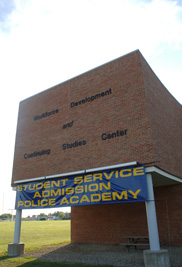Featured Article
Kent State Receives Grant for Study of Carbon Consumption by Microorganisms
Three Kent State University professors recently received funding from the U.S. Department of Energy (DOE) for a molecular analysis of carbon consumption. The three-year grant, awarded by the DOE's Office of Biological and Environmental Research, will provide funding of $1,075,638 for the project.
read moreOne of a Kind: The Kent State Police Academy at Trumbull
Posted Oct. 11, 2010Kent State University at Trumbull has something that no other campus can claim administration of the Kent State Police Academy. While the Kent Campus has an academy that takes two classes of cadets each session, Kent State Trumbull recently took over the administration of those classes to create one streamlined Kent State Police Academy for the entire university system.

The Police Academy at Kent State Trumbull
"The transition was very smooth and has resulted in increased enrollment and efficiency of both programs," Catherine Kieley, academy coordinator, says.
The Kent State Police Academy opened in June 2006, and in the past four years, the academy has built a reputation as one of the best police training programs in the area. Admission standards are high and exceed the minimum state of Ohio standards. Those who do make it into the program contribute to a 99 percent final passage rate on the state certification examination upon graduation.
"At both academies, Kent State Trumbull and Kent State, we are fortunate to have attracted, as instructors, the best and the brightest in the law enforcement community," Kieley says. "This enables us to imprint Kent State's standard of excellence into a whole new generation of law enforcement officers."
The training staff now consists of three commanders and more than 50 state certified instructors. The tradition of high-quality staff began when the doors opened in 2006. Dr. Wanda Thomas, dean of Kent State Trumbull, helped create the academy by negotiating the takeover of the longstanding police academy at the MTC Training Center in Niles.
"She was able to envision what a program like the police academy would be able to contribute, not only to Kent State Trumbull and the surrounding communities, but also to the entire Kent State system," Kieley says.
Now that vision has come to life. The academy adds to Kent State's reputation for excellence, and graduates are employed in all surrounding counties including, Trumbull, Mahoning, Portage, Ashtabula, Geauga, Cuyahoga, Columbiana, Stark and Summit. In addition to local police forces, the academy has also fed into federal agencies, such as the Secret Service, FBI, CIA, U.S. Marshalls and Border Patrol, and state agencies, such as the Ohio Department of Natural Resources and the Ohio Department of Public Safety. The academy is also approved to provide Corrections Officer Training for full service facilities, such as county and local jails.
"The program has been successful from the beginning having been built on a strong foundation of an experienced staff," Kieley says.
Kieley also noted that demand for graduates from Kent State has been growing, despite the recession.
"Demand is growing, especially in the upcoming years of 2011-2012, because of the forced retirement of police officers throughout the state who are currently in a mandatory deferred retirement program," Kieley says.
That demand is reflected in the number of students who are trying to get into the program. Kieley says the academy receives hundreds of inquires for each class, but they only accept between 25 and 35 cadets.
"Our entrance standards are high, and many people have backgrounds that would never permit them to become a police officer," Kieley says. "Besides the obvious exclusions, like felony convictions, arrests for domestic violence, drug possession, etc., we also require our applicants to provide us with character references that are closely checked."
The academies offer day and night programs in the fall and winter, and an accelerated program is in the works for June.
"When the class is over and the cadets move on to their careers, the satisfaction we experience at their success, motivates us to move forward with the next group of students," Kieley says.
By Carolyn Drummond